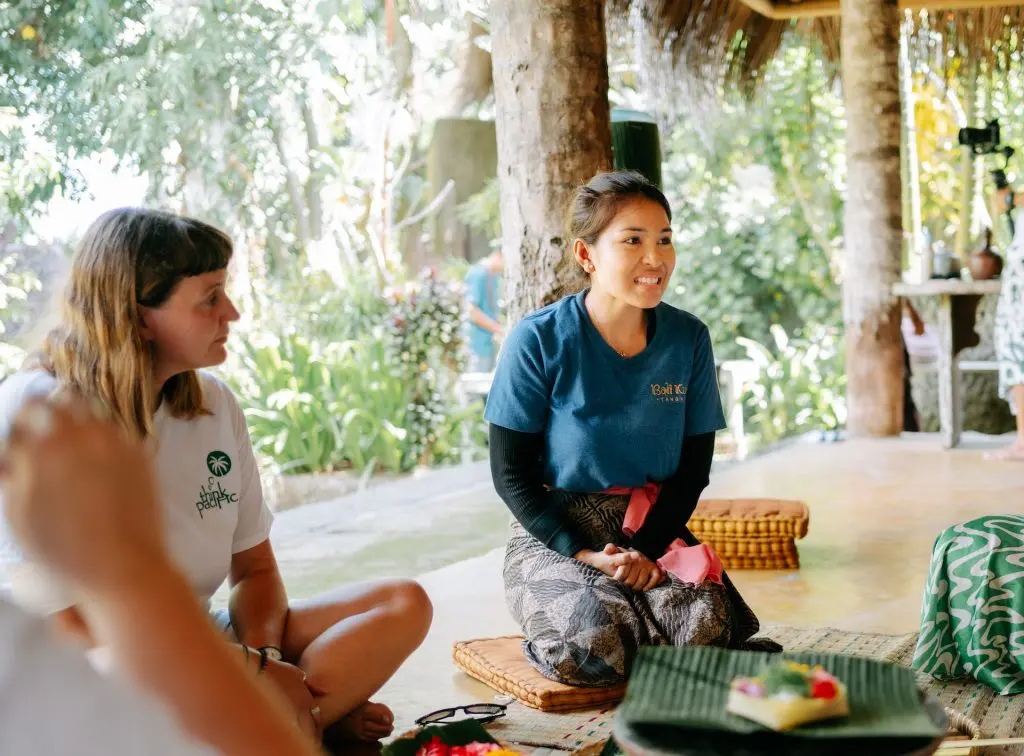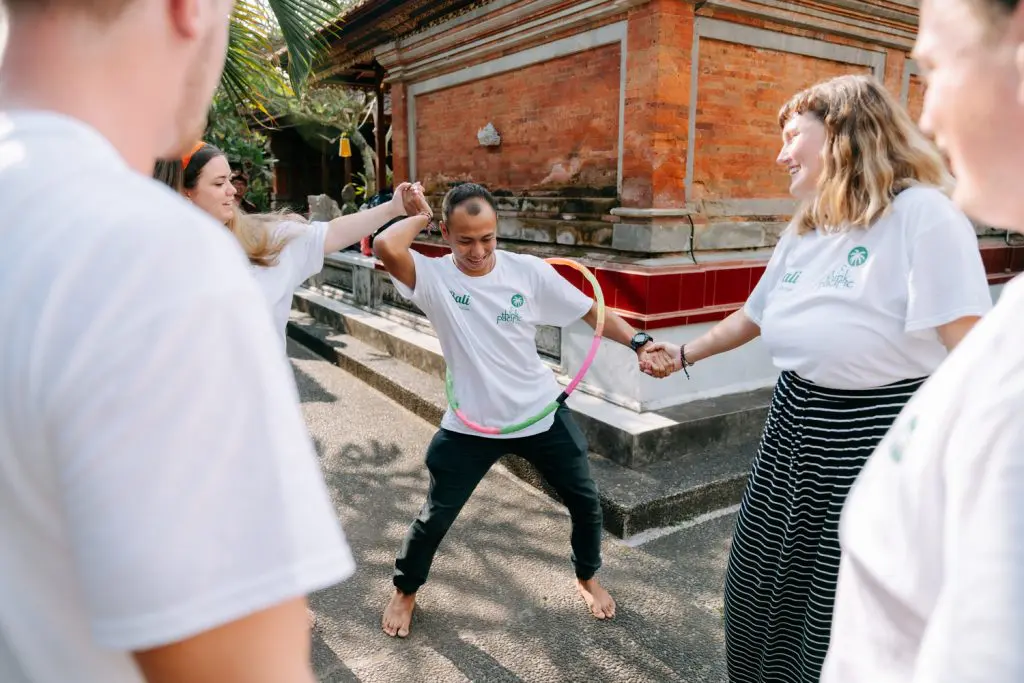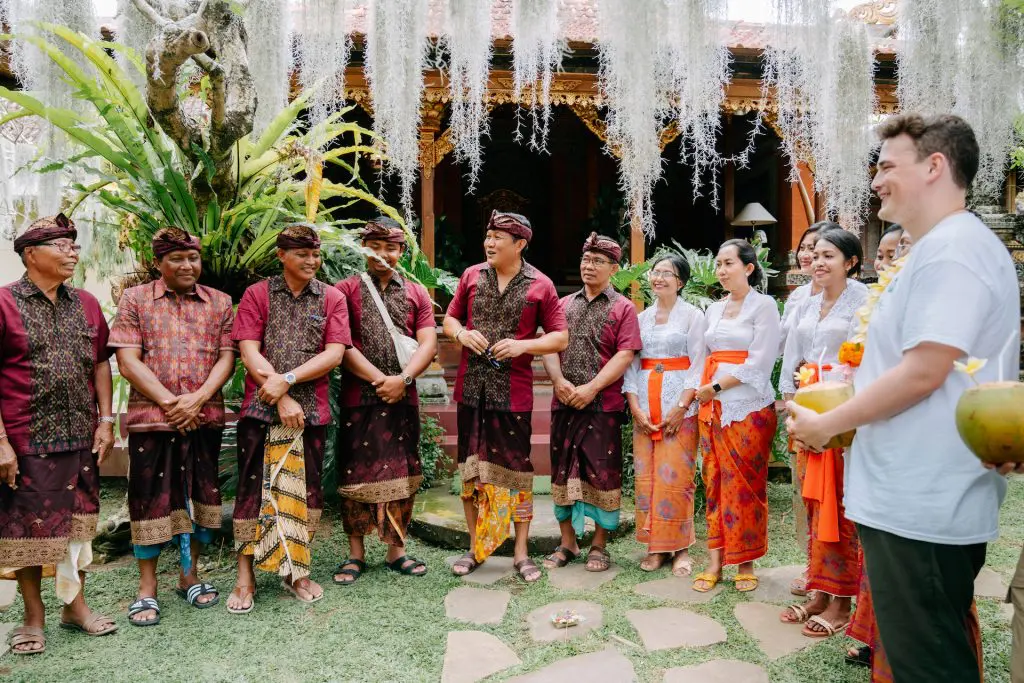Mental Health Placement - Aims & Initiatives
“Our participants support initiatives that are appropriate to your experience and skill level, just as you would in your home country, but with the benefit of learning in a global context.“
First and foremost this is a learning experience and your chance to gain context of mental health from a Balinese perspective and learn how activities, processes and support differ to your own country. You will have the opportunity to design and deliver activity sessions under the direction and in collaboration with qualified local staff.
On our Mental Health Placement in Bali, you will work as part of a team to deliver psycho-social group activities at a selection of our trusted partner projects and local initiatives. Our aim is to support both individual and community mental health and wellbeing through the delivery of this professional placement.
You will have the opportunity to learn from local professionals to develop your understanding of mental health in a global context. We will focus on community wellbeing, and allocate time to working with local people to exchange ideas and promote wellbeing through local initiatives.
On a Think Pacific Mental Health Placement in Bali, this is your opportunity to:
- Experience; Gain hands on professional experience in mental health
- Challenge; Expand your comfort zone by immersing and working in a new culture
- Alignment; We match your skills to projects that seek purposeful collaboration
- Purpose: Join a project that has been carefully crafted by local mental health professionals
- Sustainable: Provide supplementary support to sustainable local initiatives
- Learn; Learn about mental health in a new context and from inspiring partners
- Skills; Grow your ‘soft skills’ such as teamwork, communication, emotional intelligence & leadership
Respected Local Initiatives + Cross Cultural Learning + Local Empowerment = Unique Professional Mental Health Placements
3 x Unique Components Explained..

We start each week with learning and development. Every Monday, we will have a workshop from a local Indonesian professional, who has experience or supporting mental health and wellbeing in Indonesia.
Exchanging skills and ideas with local professionals and learning more about cross cultural mental health management is central to our programme.
You will also use your time on Monday for activity support session planning. Here you will plan the delivery of your sessions for the upcoming week. Our team will support you with this, building on key feedback from project staff and service users to ensure tailored support. We encourage you to use your experience, online resources and materials to ensure an academic base to your activity planning.

Tuesday, Wednesday and Thursday are our Activity Support project days. You will visit 6 projects each week, one in the morning and one in the afternoon.
As part of a small group, you will facilitate group psycho-social activities at our partner projects, including community centres, day centres, schools and institutions. You will work in a variety of projects, supporting the mental health and wellbeing of children, adults and the elderly.
We work closely with each project and receive regular feedback, to ensure your activities are aligned with the outcomes and needs of each project. You will design your activity support sessions with your teammates, however, to maintain consistency for the projects, we ask you to follow a similar structure for delivery of the activities.

Our community wellbeing activities take place on Fridays. Here you will work alongside the local members of your homestay community to exchange ideas and work on local community projects and initiatives, which aim to promote wellbeing in the community, and inspire you to take action in your own home communities.
We focus on activities and discussions in three key areas of community wellbeing: environmental, social and cultural. You could be working with the village youth, adults or elderly in the Banjar (community) hall, assisting with village clean-ups, leading a group physical activity, or discussing what challenges are facing our community today and how we can take action on them.
What does an average day look like on this placement?
No day on this placement is the same, you will gain experience of planning and delivering activities, and learning from local professionals. Week 1 is dedicated to your project briefing, and your days include discussions and activities with your team, and fun team building and cultural activities.
Following this, during your project weeks (2,3 & 4), you can expect to wake up around 7 am and have breakfast in your homestay. You will then take pre-organised transport with your project group to your activity support session in the morning. Some projects are close to the village, and others up to 1.5 hours drive from the village so you will have lots of time to finalise your activity plans on the journey. You will deliver your activity support session with your group to the service users at our partner project. You will then have lunch, and the driver will take you to your afternoon activity support project, where you will run your second group activity of the day. You will then return to the homestay village, where you can relax in the evening with your peers, in a local cafe, or join a team social activity before you have dinner in your homestay at 7pm. We ask you to be back in your homestay by 9:30pm so you can get some well deserved rest.
What does an average week look like on this placement?
Your placement is split into 4 weeks. Week 1 is dedicated to your project briefing, team building camp, and welcome to the homestay village. Weeks 2, 3 and 4 are your project weeks, and they all follow the same structure:
Monday – Professional Workshop / Activity Support Session Planning
Tuesday – Activity Support Session Delivery AM/PM
Wednesday – Activity Support Session Delivery AM/PM
Thursday – Activity Support Session Delivery AM/PM
Friday – Community Wellbeing Activity/Discussion
Will I work alone or in a team?
You will always work in a team for all activity support sessions. Teams range from 3-8 people per session.
What projects will I work on?
You will work at 6 projects per week for your 3 project weeks. You will have a weekly timetable, so you will attend each of these 6 projects 3 times over the course of your placement. You will work with a range of project partners in community centres, government institutions, schools and children’s centres, supporting the mental health and wellbeing of children, adults and the elderly.
A minimum of 50% of your activity support sessions (Tuesday-Thursday) will be working with children and youth (under 18s). With the exception of the school holiday period in Bali (mid June-mid July) where you may work on more projects supporting adults and the elderly.
You will receive your individual project timetable in your briefing week when you arrive to Bali.
How will I travel to projects?
All transport is pre arranged by our Think Pacific Bali team. You will travel to your projects in cars, with local drivers we employ in the homestay village community.
What will I do at the projects?
You will deliver psycho-social group activities with the service users at our project partners. The specific activities and session plan will be designed by you and your peers, and based on project/staff/service user feedback, aims and objectives of the service. Activities will be carefully designed based around key psychological focuses and benefits to the service users mental health and wellbeing; and could include, mindfulness and relaxation, group team building, memory and cognition games, confidence building exercises, and activities to support fine/gross motor skills or daily living skills.
Will I get help to design the activities?
Yes, you will receive some key training modules during your briefing week, including session and activity planning, the power of play and non-verbal communication, and an introduction to mental health in Indonesia. In addition to this, during session planning every Monday, you will be supported by the Think Pacific team to develop your activity support ideas.
Will I be working directly with service users?
Yes, during your activity support sessions you will be working directly with service users.
What is the age of the service users?
We work with a range of project partners, so this depends on the specific project you are working on. However, we work with partners that support children, adults, and the elderly, and we will ensure that you attend a minimum of 1 weekly project with each age group to provide you with varied experience.
How will I communicate with service users without knowing the language?
During the briefing week we will show you how you can communicate with service users using non-verbal communication. English levels and verbal communication levels of service users and project staff may vary, so we aim to make the activities as inclusive as possible. Think Pacific local staff will be present at some of your activity support sessions, so they can assist in communication in Bahasa Indonesian if required.
Will there be interpreters in the projects?
We do not have interpreters with you on the project as we do not rely on verbal communication, we communicate with service users using key phrases in Bahasa Indonesian, and using non-verbal communication skills. Think Pacific local staff will be present at some of your activity support sessions, so they can assist in communication in Bahasa Indonesian if required.
Will I work in the community?
Yes, for your project weeks, you will spend Mondays and Fridays in the local community. Mondays will focus on learning and development, and Fridays on community wellbeing. Your activity support sessions are based with our project partners, some are local to the village and others in different areas of Bali.
Will I work in a psychiatric hospital?
No, the Think Pacific placement in Bali does not involve any work in a psychiatric hospital. This is not a clinical placement. You will work to promote mental health and wellbeing of all members of the population, accessing various community, educational and government services.
Will I work with a Psychologist?
You will not be supervised by a Psychologist on the placement. Professional workshops may involve talks from professionals including Psychologists and Psychiatrists but this is in an educational setting and not in a supervisory capacity. Various members of the Think Pacific staff team have mental health and psychology educational backgrounds and experience, to support you to plan and deliver psycho social activities at our partner projects.
Will I be supervised by professional staff at the projects?
You will not be supervised by a Psychologist on the placement, however, project staff will be present for all activity support sessions. Professional workshops may involve talks from professionals including Psychologists and Psychiatrists but this is in an educational setting and not in a supervisory capacity. Various members of the Think Pacific staff team have mental health and psychology educational backgrounds and experience, to support you to plan and deliver psycho social activities at our partner projects.
Will I know the diagnosis of the service users?
No, we do not require project partners to inform us of the specific diagnosis of the service users you will be working with. It may be the case that no service users have a diagnosis at a project, or all do, but this should not impact our work. We approach all projects and service users equally with respect, kindness, and an open mind, therefore, diagnostic history is not required. If there are any risk factors we need to be aware of, we will require the problems to inform Think Pacific staff of this for health and safety reasons and communicate this sensitively with the students working at that particular project.
Is there any feedback with the staff and service users?
Yes, we have a detailed feedback process for project staff and service users. Think Pacific staff have weekly calls and hold regular feedback meetings with each of our project partners to ensure our activities meet the aims of the service, and needs of the service users. We encourage our project partners to host regular discussions or focus groups with service users to gain feedback about Think Pacifics activities.
What should I do if I have a safeguarding concern about a service user or project?
We encourage you to speak with a Think Pacific Manager as soon as possible about your concern. We ask that you do not speak directly with the project staff about your concern, as this could put the individual/s at risk of harm. Think Pacific will listen to your concern and take the relevant action if required, in line with our safeguarding policy.
What workshops will I attend?
You will attend 3 professional workshops over the duration of your placement. These workshops will take place on Monday during your 3 project weeks. The workshops will be delivered by Indonesian professionals, and vary between each placement, covering topics relating to mental health and wellbeing practices in Indonesia.
Will the workshops be the same for every placement?
No, the workshops are subject to change, depending on the availability of the professionals facilitating the workshops.
Are the workshops with professionals?
Yes, all workshops will be led by Indonesian professionals working in the field of mental health and wellbeing.
What is session planning?
Session planning is time dedicated for you to plan and design your activity support sessions. You will do this with your project group, with the support of the Think Pacific team.
How will I know what to do in session planning?
The Think Pacific team will guide you through the planning process, and we encourage you to use your own creativity and research for the design of the activities.
Where does this take place?
Session planning takes place in a venue in the homestay village. This will be walking distance from your homestay.
Who will I work with?
You will work with your peers and the local community. This will vary week to week, but may include working with the local youth group, adults or elderly members of the community.
Where does this take place?
The activities will all take place in the local village community, with the specific venue depending on the weekly activity. The team will inform you of this during your briefing week.
What will I do during the community wellbeing activity?
The community wellbeing activities are designed with the local community and involve activities and discussions with members of the community and Think Pacific students. The aim of these activities is to improve ours and others wellbeing and understand how we can support the community around us.
Is this designed/led by the community or TP?
We carefully design the community wellbeing activities with the community. We based this on the framework of community wellbeing.

